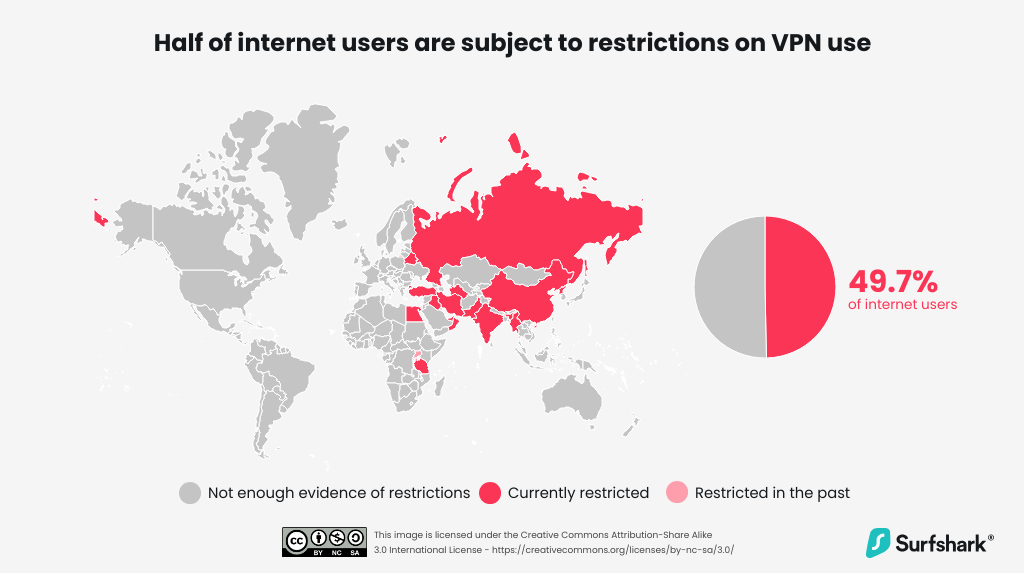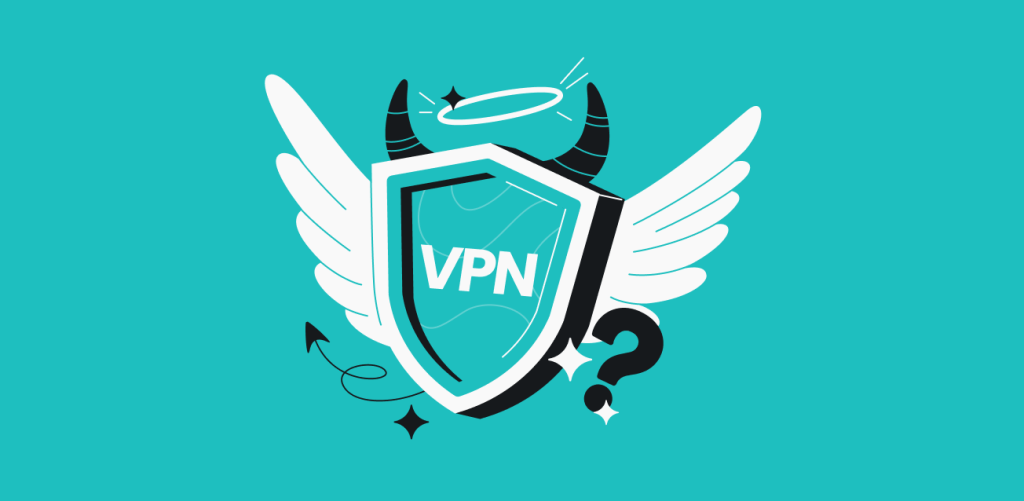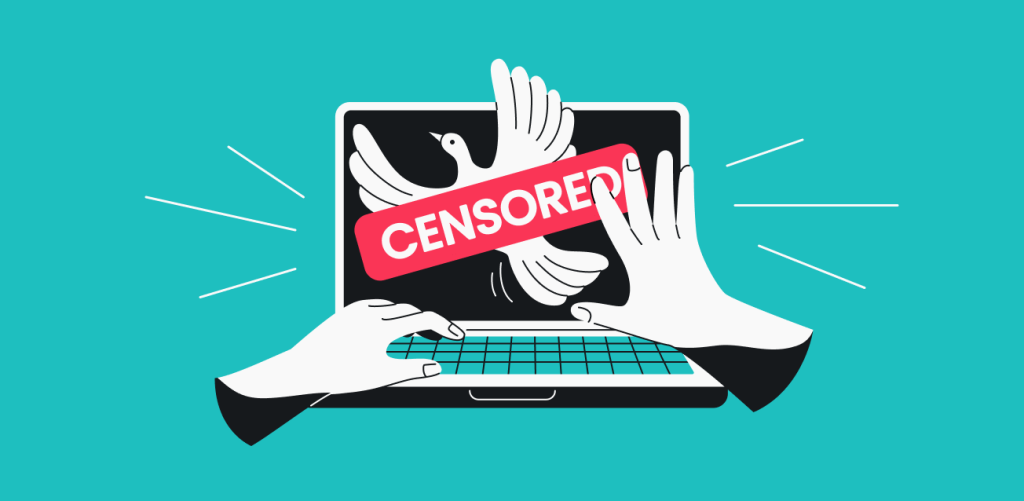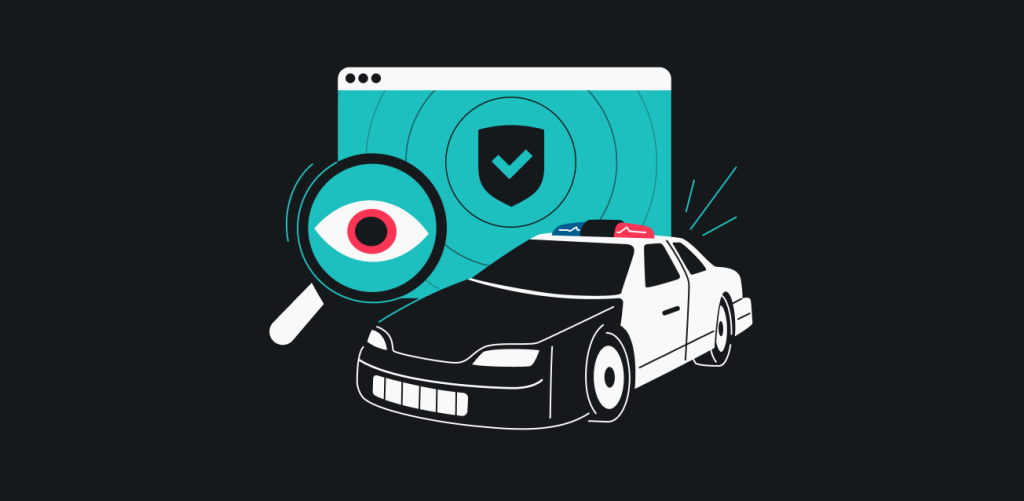Connecting to a VPN (Virtual Private Network) is legal in most countries, serving as a powerful way to secure your data and privacy on the web. Used by millions daily, VPNs mask your IP (Internet Protocol) address, encrypt online traffic, and give you private internet access.
Yet, while VPN usage is perfectly safe in most places, some countries have restricted or outright banned VPN services.
Which countries enforce VPN bans? Why are VPNs illegal there? And what does using a VPN entail in a state with internet censorship laws? Let’s get cracking.
Disclaimer: This article is based on information freely accessible online as of January 2025 and is subject to change. It is not legal advice and should be read for informational purposes only.
Is it legal to use a VPN?
VPNs are legal in most countries, like the USA, Canada, Japan, the UK, and most of Europe and Latin America. However, VPNs are illegal in a handful of countries, such as North Korea, Turkmenistan, Belarus, and Iraq.
It’s worth knowing that VPNs are important tools for citizens and activists in regions with strict internet censorship laws. Oppressive governments or ISPs (Internet Service Providers) may restrict free speech online, blocking social media platforms, streaming services, and other content deemed offensive or harmful in the name of national security.
A VPN is often an entirely legal option for people to gain safe, private internet access wherever they are.
Countries where VPNs are illegal
While citizens in most countries enjoy easy access to VPNs to change their virtual location and enjoy a safe online experience, a handful of countries have questioned VPNs’ legal status, making the tools illegal or restricted.

Unfortunately, limiting freedom of speech is nothing new for some countries — around 50% of netizens live in countries that restrict VPN usage in one way or another. Since VPN services protect the fundamental human right to privacy, authoritarian regimes are quick to impose restrictive VPN laws.
Below is a table outlining these controlling countries and their current VPN restrictions.
|
Country
|
VPN legal status
|
Reason
|
|
Belarus
|
Illegal
|
A 2015 law officially made VPNs illegal in Belarus, and the current regime is likely to further block access to VPN companies, social media platforms, and more.
|
|
China
|
Restricted
|
Only government-sanctioned VPN providers are allowed in China, but these can’t bypass the Great Firewall to access restricted content like social media platforms, making them largely ineffective.
|
|
Egypt
|
Restricted
|
Using a VPN in Egypt is legal, but internet use is heavily restricted. Attempts to access blocked content with a VPN may lead to jail time.
|
|
India
|
Restricted
|
VPNs are legal in India, but a 2022 law mandated that VPN providers store user data, limiting online privacy overall. The law even prompted many VPN providers — including Surfshark — to shut down their physical servers in India.
|
|
Iran
|
Illegal
|
Using a VPN in Iran without a permit is generally illegal. VPN blocks were officially introduced to promote local services and national security, but many see the ban as an attack on online privacy.
|
|
Iraq
|
Illegal
|
Iraq implemented VPN bans way back in 2014 to fight ISIS, but intrusive checks on internet traffic and VPN blocks remain in place to this day.
|
|
Myanmar
|
Restricted
|
Myanmar’s military junta enacted a repressive cybersecurity law at the start of 2025 that punishes unauthorized VPN use.
|
|
North Korea
|
Illegal
|
The North Korean regime tracks practically every aspect of internet usage, so VPN blocks are nothing unusual here.
|
|
Oman
|
Restricted
|
Oman’s Telecommunications Regulatory Authority only permits government-approved VPN companies. Corporate VPNs are legal but must maintain user activity logs.
|
|
Russia
|
Restricted
|
In 2017, Russia passed a law requiring VPN providers to block sites that are illegal in Russia. A 2024 crackdown named many leading VPNs illegal.
|
|
Saudi Arabia
|
Restricted
|
While Saudi laws restrict VPN usage, officials admit they’re not looking to penalize online activity like accessing restricted content. Security concerns such as terrorism are treated much more seriously.
|
|
Turkey
|
Restricted
|
Turkish citizens can still use VPNs legally, but a wave of bans in 2024 saw authorities tackling one VPN provider after another. In many cases, ISPs block access to VPNs as well.
|
|
Turkmenistan
|
Illegal
|
Turkmenistan is one of the most isolated countries in the world. Not only are VPNs illegal, but all online activity, from social media services to messaging apps, is state-controlled.
|
|
The UAE
|
Restricted
|
US non-profit Freedom House scores the UAE a lowly 18/100 on internet freedom. VPN usage is heavily restricted, and internet users face hefty fines.
|
|
Uganda
|
Restricted
|
VPNs aren’t illegal in Uganda, but their use is heavily restricted by law enforcement agencies. Ugandans can use a VPN connection to avoid paying a social media tax, so ISPs often block VPN traffic.
|
|
Venezuela
|
Restricted
|
VPN usage is legal in Venezuela, but there are severe restrictions on most kinds of online activity. Using a secure VPN is the best option many citizens have to access restricted content.
|
It’s worth noting that despite these bans and restrictions on virtual private networks, reports show that VPN popularity is surging in many of the above countries. Internet searches for VPNs are on the rise, and more citizens are finding ways to bypass VPN blocks.
Are VPNs legal in Russia?
At the time of writing, VPNs as a whole are legal in Russia, but dozens of individual providers have been banned. In 2024, nearly 100 VPN apps were removed from Apple’s App Store because they were charged with “containing content illegal in Russia.”
However, since the onset of the Russo-Ukrainian war, many people have used a VPN illegally to bypass state censorship.
Note that leading VPN service providers committed to protecting user privacy and online security have shut down their physical servers in Russia.
Are VPNs legal in India?
Using a VPN in India is completely legal, but there is a huge caveat attached to this.
As of April 2022, India requires all VPNs to keep user data for five years. This includes usernames, phone numbers, and even activity logs. In other words, you can use an India-based VPN, but your privacy may be limited, and your online activity might be recorded.
Maintaining a no-logs policy is impossible under the current laws, so most VPN service providers have moved their physical servers out of India.
With that said, Surfshark and other VPN services that don’t log your online activity offer virtual servers in India. These allow you to get an Indian IP address while using a VPN that doesn’t collect or store data about your activity.
How are VPN bans and laws enforced?
In countries with strict internet regulations, VPN laws are enforced through various methods, usually involving one or more of the following:
- Government-approved VPNs: some countries offer state-approved VPNs to encourage citizens to avoid using blocked services. Nevertheless, these often compromise privacy and security by monitoring and collecting user data;
- Fines and imprisonment: in countries with oppressive regimes, individuals caught using unauthorized VPNs can face hefty fines or prison sentences;
- Internet filtering and blocking: governments may resort to directly blocking known VPN IP addresses and ports to prevent citizens from using them;
- Server access requirements: authorities can require VPN providers to give them access to servers located in their country, violating any no-log policies the VPN companies may have;
- Deep packet inspection (DPI): DPI technology lets governments identify and block VPN traffic by analyzing individual packets of data to determine who is using a VPN and what kind of data is going in and out of a country.
Can you get caught using a VPN?
Yes, third parties can detect VPN usage. A VPN encrypts your internet traffic but doesn’t hide the fact that you’re using a VPN. So, while ISPs can’t see what you’re doing online, they can see that your data is encrypted by a VPN. If VPN use is illegal in a particular country, an ISP may report this information to the relevant authorities.
Nevertheless, some VPN services have a solution to this issue. Surfshark, for instance, offers obfuscated servers that hide the fact that you’re using a VPN and that your internet traffic is encrypted. With obfuscation, it’s harder for surveillance entities to detect and block VPN usage — no one can tell you’re using a VPN unless they manually check your traffic patterns.
What could happen if you use a VPN illegally?
The punishments for using a VPN illegally vary from country to country. In some cases, you can receive a fine or have your internet connection cut. In more extreme cases, using a VPN in a country where it’s banned can lead to jail time.
As a rule of thumb, you should only use a VPN where it’s legal and only partake in lawful activities while connected to your chosen VPN provider.
Disclaimer: Please note that using Surfshark services for any illegal activities is strictly forbidden and violates our Terms of Service. Make sure that any use of Surfshark services for your particular activities conforms to all relevant laws and regulations, including those of any service providers and websites you access using Surfshark.
Why do people question VPNs?
Unfortunately, VPNs are sometimes seen as unreliable or untrustworthy. This perception is mostly influenced by the risky practices of some free VPN providers.
Free VPNs aren’t safe. They’ve been known to sell data to third parties, track your online activity, and even install malware on your devices. As a result, all VPN providers get a bad rap for things done by a select few.
Paid VPN providers such as Surfshark — which offers the best value for the price — go above and beyond to secure your data and privacy online, ensuring safe, unrestricted internet access.
VPNs are legal — almost everywhere
While some countries restrict or block VPNs, VPN use is perfectly legal in most of the world. A secure VPN is vital to browsing the internet as it’s meant to be: safe, private, and free.
Take your online security to the next level with a VPN like Surfshark — as long as it’s legal wherever you are.
FAQ
Why are VPNs restricted in some countries?
VPNs give you more freedom and privacy online, and these are things that some governments and internet service providers are trying to limit. As a result, VPN use is restricted or outright banned in countries that limit the freedom of their citizens.
Is it illegal to use a VPN for streaming?
You can legally use a VPN to stream on most major platforms — as long as you’re watching your home country’s library. That’s why VPNs are great tools for anyone traveling abroad who wants to access content from back home.
Disclaimer: Please note that using Surfshark services for any illegal activities is strictly forbidden and constitutes a violation of our Terms of Service. Make sure that any use of Surfshark services for your particular activities conforms to all relevant laws and regulations, including those of any service providers and websites you access using Surfshark.
Are VPNs legal in China?
Yes, VPNs in China are legal, but they’re heavily restricted. Any VPN operating in China must cooperate with the government, which means they have to collect and store user activity data. The Great Firewall of China also restricts many VPNs that can help users access blocked content from other countries.
Are VPNs legal in the UK?
Yes, using a VPN in the UK is legal. No VPN laws ban or restrict the use of a VPN in the UK, but you still need to follow UK law and the terms and conditions of your service provider.
Are VPNs legal in the US?
VPNs are legal in the US, and no laws restrict VPN use. However, using a VPN in the US doesn’t exempt you from service provider terms and conditions or any legal liability in the US.
Is it legal to watch foreign TV with a VPN?
In most countries, watching foreign TV with a VPN is legal. However, doing so may be against a streaming platform’s terms of service, in which case, your accounts may be restricted.
Is it legal to use Binance with a VPN?
Yes, using Binance with a VPN is legal, but keep in mind that Binance is banned in the US*, and using a VPN to access it in the United States is against its terms of service. So, while accessing Binance with a VPN won’t get you into legal trouble, your account can still be banned.
*You can use Binance.US, specifically designed for the US market and legal for US residents.
Are VPNs safe to use?
Yes, VPNs are safe to use in most parts of the world. VPNs are one of the best tools for protecting your data and privacy online. However, some countries with heavy internet restrictions ban VPNs, making VPN use illegal.




